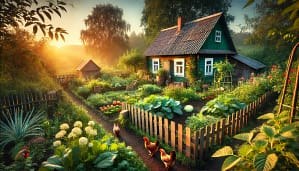This post contains affiliate links. As an Amazon associate I may earn small commission from qualifying products at no cost to you.
Homesteading is more than a rustic hobby—it’s a return to sustainability, independence, and a deeper connection with nature. Whether you dream of going fully off-grid or just want to make small changes toward self-sufficiency in your urban apartment, these beginner-friendly skills are a great place to start.
Want to fast-track your journey to self-reliance?
Discover The Self-Sufficient Backyard, a complete DIY blueprint for building a homestead on any budget—even in small spaces.
👉 Click here to learn more
1. Grow Your Own Food: Gardening Basics
Growing food at home boosts food security, promotes health, and connects you to the earth.
Start with:
- Easy crops like herbs, lettuce, and cherry tomatoes
- Container gardening or raised beds for limited space
- A focus on sunlight, soil, and watering basics
>>Download the Ultimate Seed Collection and Preservation Book Here
2. Preserving Food (Canning, Freezing, and Drying)
Preserving food extends its shelf life, reduces waste, and saves money. Homemade canned or frozen produce is free of harmful preservatives and packed with nutrients.
How to Master It:
- Begin with water-bath canning, which is perfect for jams or pickles.
- Learn to freeze seasonal fruits and vegetables properly.
- Experiment with drying herbs or fruits using a dehydrator or oven.
3. Raising Chickens for Eggs
Chickens are an excellent source of fresh eggs and help control pests. They’re low-maintenance and can be kept in backyards or suburban areas.
How to Master It:
- Research chicken breeds suited for your climate and needs (e.g., egg production vs. hardiness).
- Build or buy a basic chicken coop and learn about proper feeding and hygiene.
- Start small with 3-4 chickens to get the hang of it.
Build Your Own Coop & Get 100+ DIY Homestead Projects
Explore Self-Sufficient Backyard Now →
4. Composting for Healthy Soil
Composting reduces food waste while creating nutrient-dense soil that’s perfect for gardening. It’s a sustainable and eco-friendly practice anyone can adopt.
How to Master It:
- Create a compost pile in your backyard or invest in a compost bin for smaller spaces.
- Learn what materials are compostable (kitchen scraps, yard waste) and what to avoid (meat, dairy).
- Turn your pile regularly to encourage decomposition.
5. Cooking from Scratch
Cooking at home is healthier, cost-effective, and empowering. By ditching pre-packaged meals, you control the quality and nutrition of your food.
How to Master It:
- Learn basic recipes like bread, soup, and pasta from scratch.
- Stock up on pantry essentials like flour, spices, and oils.
- Experiment with homemade sauces, broths, and baked goods.
6. Learning Basic Carpentry Skills
Carpentry empowers you to build things like garden beds, coops, or shelves, saving you money while boosting your self-reliance.
How to Master It:
- Start with simple projects like a raised garden bed or a basic wooden stool.
- Invest in beginner tools like a saw, hammer, and drill.
- Practice measuring, cutting, and assembling with scrap wood.
7. Foraging for Wild Edibles
Foraging connects you with nature while providing free, nutrient-dense foods like berries, herbs, and mushrooms.
How to Master It:
- Research local wild edibles common to your area.
- Use field guides or apps to identify plants safely.
- Learn about ethical foraging to ensure sustainability.
8. Making Natural Cleaning Products
DIY natural cleaners save money, reduce chemical exposure, and are eco-friendly. You’ll ditch harmful toxins while keeping your home fresh.
How to Master It:
- Start with simple recipes like vinegar and baking soda for an all-purpose cleaner.
- Experiment with adding essential oils for scent and antibacterial properties.
- Store your products in reusable glass containers for sustainability.
9. Sewing and Mending Clothes
Sewing helps reduce waste by repairing clothes instead of throwing them out. It’s a practical, creative skill that saves money and resources.
How to Master It:
- Begin with basic hand-sewing techniques like hemming or patching holes.
- Gradually learn to use a sewing machine for larger projects.
- Try simple projects like making tote bags or aprons.
10. Collecting and Purifying Water
Water is essential for survival. Collecting and purifying rainwater reduces your reliance on municipal supplies and ensures access during emergencies.
How to Master It:

- Install a simple rain barrel system to collect water.
- Learn about basic purification techniques like boiling or using filtration systems.
- Experiment with DIY methods like making a bio-sand filter.
Discover Legal Ways to Collect Rainwater + DIY Filter Plans
👉 Download the Water Collection Blueprint Here
Ready to Build Your Self-Sufficient Life?
You don’t need acres of land or a big budget to get started. Each small step—from planting herbs to composting or learning to preserve food—builds confidence, independence, and resilience.
Take the Shortcut to Self-Sufficiency
Learn from a real-life homesteading couple who turned a 1/4-acre lot into a thriving off-grid haven.
👉 Grab Your Copy of The Self-Sufficient Backyard Today
FAQs About Homesteading Skills
1. What is the easiest homesteading skill to start with?
Gardening is the easiest to begin with! Start small, like growing herbs in pots, and work your way up to vegetables.
2. Can I learn homesteading skills if I live in a city?
Absolutely! Many skills, like composting, cooking from scratch, or making cleaning products, are perfect for small urban spaces.
3. Is it expensive to start homesteading?
Nope! Many skills, such as foraging, composting, and sewing, require minimal upfront costs.
4. How do I find local resources to help me learn?
Check out community gardening groups, farmers’ markets, or library workshops for hands-on learning opportunities.
5. How much time does homesteading take?
It depends on your goals, but many skills, like cooking or composting, can be integrated into your daily routine.
6. Are there online courses for learning homesteading skills?
Yes! Platforms like Skillshare and YouTube have countless tutorials and lessons for beginners.
Why Homesteading Is Worth It
Homesteading isn’t just about growing your food or raising chickens—it’s about creating a lifestyle of independence and mindfulness. Each skill you learn brings you closer to nature, reduces your reliance on store-bought products, and builds confidence in your ability to thrive, no matter the circumstances.
Conclusion: Start Your Homesteading Journey Today!
You don’t need acres of land or fancy equipment to start homesteading. With just a little curiosity and determination, you can master these 10 homesteading skills and create a more self-reliant, fulfilling life. Pick one skill, watch a video (I’ve got you covered!), and start small. Before you know it, you’ll be growing, preserving, and thriving like a seasoned homesteader.
Ready to get started? Share this post with a friend who’s interested in homesteading, and let’s build a more sustainable future together!








